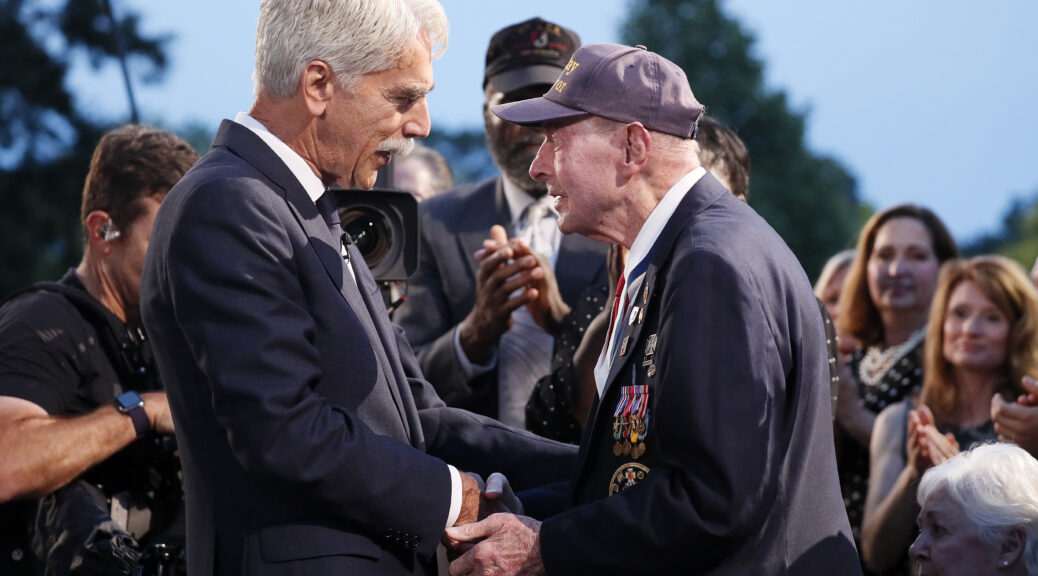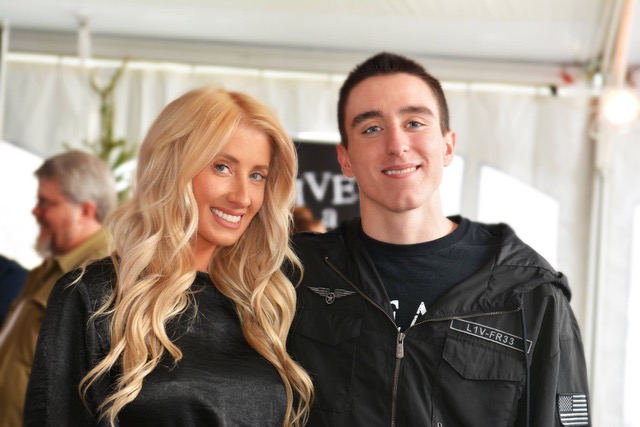For a long time, U.S. Army Staff Sergeant Ray Lambert remained silent about fighting in World War II and the historic D-Day invasion where he single-handedly saved over a dozen men. But the last few years, the 99-year-old former medic has been very candid about what took place during the war so the American soldiers who died won’t be forgotten.
By: Heather Newgen
By the time he was 23, Ray Lambert had fought in North Africa, where he earned the Silver Star after driving a jeep into enemy gunfire to get his troops out; he went to combat in Sicily, and in June of 1944 he joined roughly 73,000 Americans for what would be his third and final invasion: D-Day, the turning point of WWII that helped lead to the defeat of the Nazi forces in Europe.
Seventy-five years ago, Lambert, who was part of the First Division’s famed 16th Infantry Regiment, hit the cold, gray shores of Omaha Beach with the first wave of troops. His brother Bill served alongside him and the two Alabama natives made a pact to take care of each other’s families should something happen. The brothers parted ways upon arrival in Normandy and with bullets flying towards their packed Higgins boat, Lambert jumped out and began pulling drowning injured soldiers to land.
The Staff Sergeant was hit but he didn’t stop.
“Something went through my right elbow and that kind of shattered my elbow and caused some bleeding. I kept working and didn’t pay much attention to that. I saw a guy hung up on barbed wire. I went in to get him off the barbed wire and had a difficult time. I got him loose and something hit me in the thigh, halfway between my hip and knee. It knocked a big hole [in my leg] almost to the bone and actually kind of knocked me down. I got up and put a tourniquet on just above the wound. I told one of my corporals to try to get more men over to the big rock so they could save them and treat them,” he told The Voluntourist.
But not even two serious injuries stopped the army medic. He continued on his mission.
“I was bleeding very badly and getting weaker, but I saw a guy’s arms up in the water. I realized he was in trouble and went there to get him. When I got to him his equipment was also hung up in the barbed wire and an underwater mine had been set off and he had some injuries. I got him with my right arm, the one that was shattered, and had that around him. I was working with my left hand and finally after going down twice in the water I got him out.”
He added, “As I turned to go back towards the beach, a Higgins boat came in and when he dropped his ramp it hit me in the back and pushed us both right to the bottom. It crushed the lower part of my back and I thought for sure we were both going to die. I said a prayer. I asked God to give me one more chance to save this person. For some reason unknown to any of us, that ramp rolled up and the boat moved to a different spot. My guess is the boat was in the wrong place where fire power was coming in. It was so heavy that they decided to move down the beach. I got the guy out and got him back up. By then I was in terrible shape. I was bleeding terribly bad so I passed out on the beach.”
A few hours later Lambert woke up on a landing ship and his brother Bill, who had also been shot, was next to him. Both went home.
The Voluntourist first talked with Mr. Lambert, a four time Purple Heart receipt, last year in Washington D.C. at the National Memorial Day Concert on PBS where he was celebrated for his countless acts of courage and bravery, something he’s very humble about. We recently had the chance to follow up and speak with him again.
The Voluntourist: Last year you were honored at the National Memorial Day Concert and this year your story will be told again on the show by Sam Elliot. What was it like to attend the event?
Ray Lambert: It was very touching to me to sit there and listen to the story and it brought back so many memories of my guys. Also I was very proud that I had been able to accomplish and live through those things that now it seems to be important to people and young people. I always have mixed feelings when listening to some of the things that I’ve done, things that have happened to me. But that was just a wonderful day to be there. Then later of course meeting people from Fox I talked to and you, that was a lot of fun also. I’m always happy to do what I can to bring back memories to other veterans. They’re all so important and it’s getting down to just a few of my era and generation. I was in North Africa, Sicily and D-Day. From the 1st Division, I don’t think there’s over two of us left that was in all three invasions, so it’s always interesting to hear the younger people I talk to ask questions about those three invasions.
The Voluntourist: I understand you were apprehensive to tell your story. Why?
Ray Lambert: There’s two reasons. One is, you don’t like to remember how people were torn apart and those kind of things, you just don’t like to talk about it for a long time. I had no intentions of ever talking about it again, but when I realized they couldn’t do their own talking, their families never knew how things were really because their sons and daughters were killed. That’s when I thought it was a responsibility that I thought I owed to families, other families, that didn’t get their sons and daughters back. Then I started talking more about it and the more I talked about it, the better it makes me feel that those guys who died on the battlefield have some representation that were there also and can tell people how it was, how brave they were and how they just kept going day and night, never complaining and just doing their job.
The Voluntourist: Is that when you decided to write your book Every Man a Hero?
Ray Lambert: Yes, because today the word hero doesn’t seem to be as important as it was years ago. I know there are plenty of heroes out there today, but when soldiers lived the way they did in the woods like animals and faced death every single day, then kept moving forward and forward. We knew we were going to lose 15 percent of the guys in every company. So you just go in trying to do your job and not think of getting killed. You just walk into the danger every minute of every day. I wanted people to know the story of those guys.
RELATED: How Sergeant Ray Lambert is Honoring his Fellow Soldiers 75 Years After D-Day
The Voluntourist: I understand people suggested the title of the book should be Ray Lambert a Hero, but you wouldn’t go for it.
Ray Lambert: Yes, when they wanted to do the book they were talking about Ray Lambert the hero and I said, “no, no way am I going to do that. My men were all heroes and they all did their job and faced the same danger.” Some of us did a few things that others didn’t, but still every man that made that D-Day invasion was a hero in my opinion.
The Voluntourist: Absolutely! How often do you think of Normandy and the men you were with in battle?
Ray Lambert: Almost every day. Just a few minutes ago I was thinking about the guys and how they never lived to see their grandchildren and great grandchildren, or to have a home or married life. It will never leave me. There’s so many that I knew from 1940 through Africa and through Sicily. We’re all like a family and it gives me a lot of good feeling and satisfaction to think about all the guys we knew and had so many laughs with and so many sad moments too.
The Voluntourist: You arrived to Normandy in the front of a cramped Higgins boat where you were shot at the moment you hit the shore. Do you remember the ride there? What were you thinking, feeling?
Ray Lambert: I had been on two other invasions, so I knew what to expect, but going in the water was very rough and everyone got seasick. Everyone was throwing up all over the place and the wind was blowing it back. If you weren’t seasick, you’d get sick from all the stuff going on. Some of the guys were very quiet. One guy was standing right behind me and he was saying some things from the Bible and I couldn’t understand him because the noise was really rough, but I know he was doing that. There was one guy trying to move around in the boat. It was very crowded. There was a lot of concern because we knew exactly what we were going to get into, but it was of course a lot worse than we thought. It was a time where your mind was pretty much tied to the job you were going to have to do.
The Voluntourist: How aware were you that winning the invasion was pivotal to winning the war?
Ray Lambert: We had been told that this was “do or die” as we used to say. If we didn’t make it, there was a good chance that all of our guys would be destroyed and that the war would probably be lost. That’s what General Eisenhower and the other guys were talking about. We had to do this and it was an awful responsibility to put on young guys. We had guys that were 17, 18, 19-years-old. We knew we had to do our job.
The Voluntourist: You’ve seen so much tragic untimely death, what makes you keep going after everything you’ve experienced?
Ray Lambert: The enjoyment I get of doing something hopefully for someone else, and to make someone else smile or laugh. It makes me feel good. I’ll be 100-years-old November 26th, and I can’t do some of the things I did, but I still enjoy being with people and I still enjoy talking about my men and the fun that we had. One of best friends was Howard [Buck] Shute. He was a captain. He and his wife and my wife were all close friends back in the forties. The only two people left out of that group now is [me and] Buck Shute’s wife Florence. She lives in New Jersey and she’s a year older than I am. I talked to her last week. She and I have conservations about the old days and things that went on. We all had no money and used to get cheese and crackers from the mess hall and have that for our evening meal sometimes. All those kind of wonderful things that happened to us when we were young and all together. That keeps me going. I just feel every time if I can call Florence and talk to her it’s going back to my oldest friend that I have still living. We just always laugh about things. It’s the energy that I get from other people and knowing that I may have an opportunity to do something for someone else–those are the things that keep me going.
To see more of Lambert’s story, watch the 2020 National Memorial Day Concert Sunday, May 24 at 8/7c on PBS.




